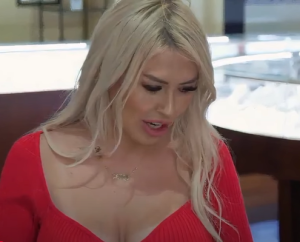In the dim glow of a room that feels forever charged with unspoken words, the story unfurls like a blade drawn from velvet. A man moves through shadows, his footsteps keeping time with the tremor in his own voice, as if every syllable he speaks might either mend a crack or split the world again. The air is thick with the weight of promises kept and promises broken, a tension that tightens the very fabric of the moment.
From the outset, a decision sits heavy on shoulders that have learned to bear more than their share of sorrow. The dowry—the tangible echo of a union once imagined to be unbreakable—returns to its rightful owner, not as a symbol of triumph but as a stark, haunting reminder that what seemed secure can still be undone by a single glance, a single word spoken in haste or fear. The exchange is not a transaction so much as a ritual, a sobering acknowledgment that ownership and affection can drift apart like ships unseen on an endless sea.
Kara stands at the crossroads of destiny and doubt. There is age in her quiet gaze, a weathered wisdom that the years deposit not in the glitter of youth but in the gritty texture of experience. She has lived long enough to know that men, even those with warm smiles and easy tenderness, harbor compartments of trickery and hurtfulness that can swing open with the wrong trigger. The world around her feels both intimate and immense, as if every corner holds a memory waiting to turn and reveal another layer of truth.
Adnan moves with the careful care of a man who has learned to measure every breath. His path is a study in contradictions: outward calm that masks a storm, and a desire to be seen as noble that keeps brushing against the jagged edges of his own choices. There is a tenderness that flickers in moments of vulnerability, but it is tempered by the knowledge that trust must be earned anew with every sunrise. The past, like a stubborn specter, refuses to fade, insisting on its right to shape the present and the future.
The room—an arena of private war—seems to tilt with the weight of unspoken accusations. It is here, in the tight space between confession and denial, that the gravity of betrayal is laid bare. The narrative tightens around a circle of truths that won’t stay quiet: the dowry sent back, the implied legitimacy of love tested against the strict ledger of loyalty, and the unspoken bargain that binds two people together even as it pulls them apart. Each line spoken feels like a thread pulled from a larger tapestry, revealing a frayed edge that could unravel everything in an instant.
A chorus of glances passes between them, electric with the unsaid. The room holds its breath as if listening for the moment when a whispered secret will erupt into a roar. The audience—the unseen observer—feels the pulse of the tale as if it were their own heartbeat, quickening with every near-miss, every misstep, every fragile decision that could either rebuild what was fractured or push it beyond repair. The tension is not merely about who did what; it’s about what each of them has become in the space between obligation and desire—the person who chose, the one who resisted, the one who hesitated at the edge of a vow.
As the story deepens, the act of betrayal is not a single strike but a pattern—subtle, almost cinematic in its precision. A word here, a silence there, a gesture misread, a gesture misread again until the meaning is carved into the heart with merciless clarity. The people on stage—whether they are fully understood by the audience or not—begin to resemble a landscape scarred by wind and rain, where every contour speaks of weathered grief and hard-won resilience. The audience is asked to witness not a melodrama of grand confrontations alone, but the quieter, more insidious erosion of trust that happens when two souls, once joined by a simple yes, are asked to navigate a maze of doubts.
In the midst of this emotional crucible, Kara becomes the axis around which the entire moral universe seems to turn. Her patience is both a shield and a beacon, illuminating the path that remains possible even as the ground beneath shifts. Her stature—never merely physical but emblematic of endurance—tells a story of a woman who has learned to measure strength not by force of will alone but by steadfastness in the face of winds that threaten to scatter everything she holds dear. There is beauty in her resolve, even as it is tempered by disappointment, a beauty that commands the room’s attention and earns a reverent silence from those who understand that redemption requires more than an apology—it requires a transformation of the self.
Adnan, caught between two tides, is compelled to reckon with the consequences of choices that once seemed innocent or necessary. The path of reconciliation is paved with fragile hopes that shimmer at the horizon but seem to vanish when tested by the rough seas of suspicion. The narrative invites us to watch him not merely as a culprit or a martyr but as a human being who grapples with the gravity of his own history. The tension rises as he attempts to reconcile the truth with the illusion that comfort and certainty can coexist with the risk of losing everything that meaningful to him.
The moment of revelation—when a whisper becomes a gale—arrives not with the fanfare of a grand confession but with the slow, merciless sweep of truth across the stage. Lies, once cleverly tucked away, begin to surface like embers that refuse to die. Pieces of the past click into place, revealing a mosaic that is both damning and instructive. The audience finds itself leaning forward, not out of cruelty, but because the narrative has earned the right to demand their full attention: this is not merely a story of wrong and right; it is a meditation on the fragility of human connection and the perilous journey toward forgiveness. 
And then, as often happens in such nocturnes of emotion, there emerges a glimmer of something more enduring than bitterness: a possibility, however precarious, that trust might be rebuilt. The characters stand at the edge of a new understanding, where the old rules no longer hold and the heart must be navigated with a different compass. It is not a guarantee of absolution, but it is a path—a fragile thread that could still lead to a reunion built on honesty, accountability, and a shared willingness to let go of costly grievances.
In the closing cadence, the room settles into a suspended finality. The dowry is no longer just a sum or a symbol, but a testament to the complicated choreography of love and duty. Betrayal, once the loud, undeniable note, eases into a quieter, more intimate refrain: the awareness that people are capable of both great tenderness and deep misjudgment, and that the hardest work of all is to choose to begin again after the breaking. The lights dim, and the audience carries with them the echo of footsteps retreating into the corridor of memory—carrying with them the ache of what was lost, and the tentative, cautious hope of what might still be salvaged.





